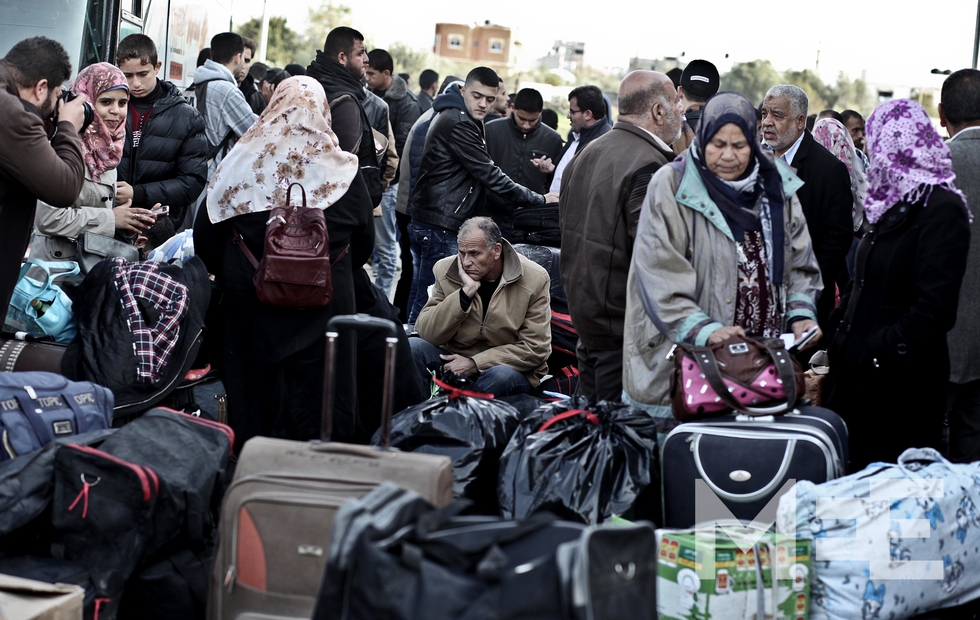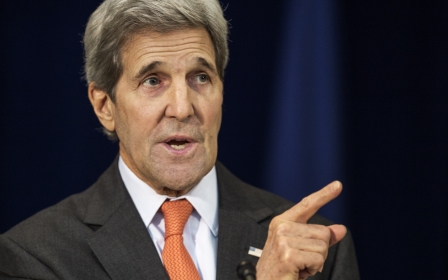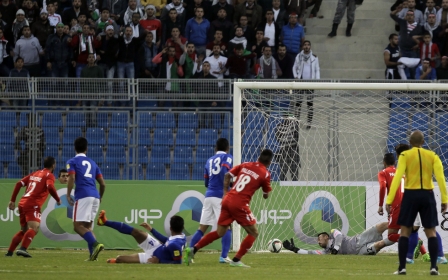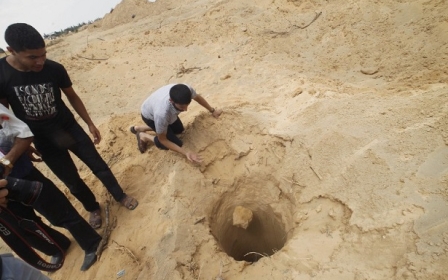IN PICTURES: Waiting to cross Rafah

RAFAH, Gaza - Despite the frigid weather, thousands of people have been standing at the gates of Rafah Crossing between Gaza and Egypt waiting for them to be opened.
Mothers, along with their children, have sat on suitcases and boxes waiting to be allowed into Egypt to follow their dreams of getting back home, or to university, school, or hospital, or to be re-united with their families. Crossing the border can take several days – even months.
“I have been stuck here in Gaza for six months. I came for a visit to my family,” says Umm Basima, an Egyptian mother, who left her husband and four children behind.
Those waiting in ambulances - including patients with cancer – have also sat in limbo. A rare opening in the past two days was supposed to be for Egyptian citizens, students and those that need medical attention, but 48 hours wasn’t long enough to allow everyone to pass through.
Rabi’a Abdelhadi, accompanying his aunt, told Middle East Eye: “If cancer patients are not even a priority, who else is likely to get through?”
Samer Abu Jalal, 22, and Ala Shurab, 21, both medical students supposed to be joining their universities in Cairo, are unable to cross into Egypt as a result the Rafah shutdown.
“I have been waiting here for some magic to happen - for the gates to finally open so that we can get through, to study,” said Shurab.
Shurab finished her secondary school with high enough grades to qualify her for study abroad, and her mother had saved enough money to cover her expenses. But Shurab’s dream cannot become reality if the Rafah gates remain closed.
“For God’s sake, just let us cross through the gate, and we won’t disturb your dreams,” said Shurab.
Egyptian authorities have kept the crossing closed for more than 100 days with only a few openings that last a couple of hours. For those wanting to travel to Egypt, it’s a guessing game as to when the Egyptians will bring the keys.
Over the two previous days, Egypt had opened the crossing, but Gaza border control officials announced that only 1,500 travellers of the 25,000 registered people would be allowed passage. This year, Rafah has been open a total of only 19 days, including the most recent two days.
Even an elderly man who holds dual-citizen passports – a Palestinian document and an Egyptian passport – can’t pass through the border gate. Around him, hundreds of other people of all ages have sat in the cold and expressed frustration, anger and sickness.
“I neither forgive nor forget,” he told MEE while tightly hugging his Egyptian passport.
On social media, activists have called for public campaigns to demand an end to the irregular controls at Rafah and for Palestinian Authority (PA) control over the crossing on the Palestinian side.
Alaa Reid Boray, a Palestinian, posted a demand on Twitter that all political parties must adhere to humanitarian standards and open Rafah Crossing.
“I was thinking that if Mahatma Gandhi was alive, would he have struggled to set us free from this apartheid oppressive Rafah Crossing?”
Gazan and Egyptian authorities have not yet responded to the comments on social media, but people such as Umm Basima, a 45-year-old mother who cares for her disabled 16-year-old son, told MEE that her pleas have gone unheard.
“For the sake of humanity, allow us to get to a hospital in Egypt,” she said. Her passport has been stamped on the Gaza side, but she has now had to wait for the Egyptians to open the gate at the other side.
She has been asked to pay $3,000 in order to find her name on a document listing travellers to be allowed through the Egyptian border. She would not give details of who requested the money, but she said it gets paid via a middleman in Gaza.
“I don’t have the money, and even if I have that money, I will never pay in order to get back to my country.”
Egyptian President Abdel Fattah al-Sisi told Palestinian President Mahmoud Abbas in Paris that he is willing to open Rafah Crossing once the PA is back in control in Gaza. Sisi considers Hamas, which effectively controls Gaza, an ally of his main rival, the Muslim Brotherhood, and refuses to deal with them.
For Hamas, the Rafah and Kerem Shalom crossing controlled by Israel are the last resort for financial revenues, as the tolls imposed at the crossings provide one of the few ways to pay the wages of Gaza’s 42,000 government employees.
New MEE newsletter: Jerusalem Dispatch
Sign up to get the latest insights and analysis on Israel-Palestine, alongside Turkey Unpacked and other MEE newsletters
Middle East Eye delivers independent and unrivalled coverage and analysis of the Middle East, North Africa and beyond. To learn more about republishing this content and the associated fees, please fill out this form. More about MEE can be found here.




